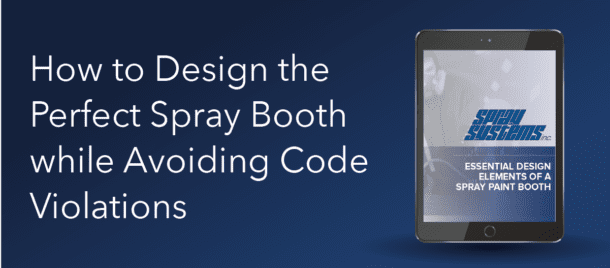Read time: 3 minutes
Summary
- New-age materials in manufacturing mean companies need to prepare their spray booths for more change, now.
- Most spray booth operators can expect to see more aluminum vehicles, parts, and components in the years ahead.
- Shop and manufacturing environments that handle aluminum should designate specific tools and an isolated area for working on the substance.
- Aluminum and fiberglass present health dangers when handled incorrectly. Workers should wear ample protective gear to shield their skin, eyes, and lungs.
Every decade of the last century has seen developments in materials science, including some that reshaped entire industries. While these developments allow for greater safety, performance, and efficiency, they can also cause complications at various stages of the manufacturing process.
The introduction of new materials means companies need to take the time to understand what makes them different from the familiar. Every specific material has its own unique handling requirements, so operators should conduct careful research and talk to experts when there’s any doubt.
Aluminum
Along with being one of the most abundant elements on Earth, aluminum is also relatively light-weight for its durability and strength. This makes it ideal for vehicle components, which is why it features prominently in modern aircraft designs. Most spray booth operators can expect to see more aluminum vehicles, parts, and components in the years ahead.
While it offers many distinct advantages over other metallic alternatives, aluminum isn’t without its flaws or risks. It’s difficult to purify following contamination compared to some other metals. Long-term exposure to aluminum has also been associated with various health problems, particularly when exposure is through the respiratory system.
Shop and manufacturing environments that handle aluminum should designate specific tools, and a specific area if possible, for working on the substance. Workers should also wear ample protective gear to shield their skin, eyes, and lungs. These measures help isolate aluminum to prevent it from contaminating other metals and minimizes health risks to the workplace.
Fiberglass Composites
Fiberglass is a simple term that describes a diverse and complex group of new-age materials that have applications in dozens of major industries. This material originated as a form of plastic reinforced with glass fibers, which provided its namesake. Modern composites are made from many different materials aside from glass, with carbon fibers being among the most common ingredients.
Much like aluminum, fiberglass presents its own share of health dangers when handled incorrectly. A designated, isolated environment is ideal when grinding, sanding or modifying the material’s dimensions in any way. Composites can become a health hazard when exposed to the skin, eyes or respiratory tract.
Applying paint and finish to composite surfaces can also be a unique challenge that requires special chemicals, processes or preparation. The non-porous nature of the material forces manufacturers to treat the surface prior to paint application. Operators should carefully examine the individual material properties of each composite they handle to ensure quality and safety.
Resins
Resins are similar to fiberglass composites, so they share many of the same features. In fact, composites include different forms of resin as a primary ingredient. This form of plastic material can be extremely malleable before it’s set, which makes it an ideal candidate for certain parts and components.
Resins pose some unique challenges to booth operators, particularly in their potential negative interactions with spray and finish chemicals. Some common paint removal chemicals, like acetone, can change the nature of the resin just as easily as it can remove layers of paint. Some resin compounds can also lose their integrity when exposed to high levels of heat.
Preparing Your Booth for a New Age
Whether the innovation is minor or monumental, the advent of any new material can impact every part of the manufacturing process. Aside from aluminum, composites, and resins, there are plenty of novel metal alloys and other manufacturing alternatives on the technological horizon. This means that the best time to get ready for the future is now.
As an experienced industry leader, Spray Systems prepares our customers to take on a new age with new materials. We consult, design and implement solutions to help operators run their booth more effectively, efficiently and safely, no matter what kind of materials they work with. Contact us today.

